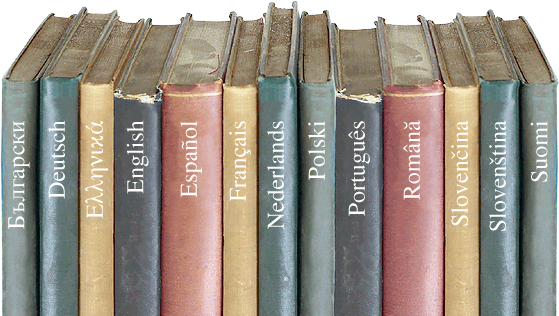by Karen Ball
I love languages. I started studying French in the 7th grade (“Bonjour, Monsieur DuPree. Comment-allez vous?), and by the time I had my double college degree in multiple-languages and journalism, I’d studied French (12 years), Spanish (5 years), and Russian (1 year). But I confess, I never expected to have to learn a new language when I entered the publishing world.
Surprise!
I remember the first time I realized words and terms had very different meanings in publishing. As a PK and PGK (preacher’s kid and preacher’s grandkid), I knew my duty to widow and orphans. It was right there in the Bible. So you imagine my astonishment when I discovered it was now my goal to kill the widows and orphans. Then I learned that bleeding in the gutters had nothing to do with murder, that picas weren’t fuzzy little forest animals, leading wasn’t something done to stained glass, fonts weren’t receptacles for baptismal water, a kill fee wasn’t about hiring a hitman, and a galley wasn’t the kitchen on a ship.
It all reminded me of a line from a poster I had up in my college dorm room: I know you believe you understand what you thought I said, but I’m not sure that what you heard is what I really meant to say. Or the poster in a friend’s room that said, “I’m not as drunk as some thinkle peep I am.” (Okay, it has absolutely nothing to do with that last one. I just put it in because it makes me laugh…)
It’s taken years of study and practice, but I’m finally fluent in Pub-Speak. Or so I thought until a few days ago when I had a discussion of editing terms with the illustrious Steve Laube. It went something like this:
Me: I’ll do a macro edit.
SL: So…that’s the line-by-line edit?
Me: No. The macro is big-picture stuff. Story, plot, character development. What you’re talking about is a line edit.
SL: But I usually call that the substantive edit and the line-by-line stuff the copy edit.
Me: No, the copy edit is jot-and-tittle stuff. Punctuation, grammar.
SL: Isn’t that also done at the proofreading stage? So the line edit is…?
Me: A line-by-line edit, where you make sure sentences are put together right…
SL: So you’re talking about grammar.
Me: No, that’s the copy edit. This is more about structure and flow and word choice.
SL: I thought you said that was the macro edit.
Me: AAAAAUUUUGGGGHHHH!
Clearly, my understanding of publishing terms, which I learned from the houses where I’d worked, didn’t match what Steve had learned these same terms meant. And here’s the truly frustrating thing: it’s possible that these very same terms mean something entirely different to other editors out there! Don’t miss Steve’s blog on “The Editorial Process” where he shows how easy it is to get confused.
SO, how do you communicate to an editor or agent what it is you want/need done with a manuscript? I’ve discovered the only surefire method is to the old adage “A picture is worth a thousand words” to heart. Meaning take a section of text, do the kind of edit you want on it, and send it as an example. If you’re not an editor at heart, then copy and past an excerpt of text your editor has worked on, with the edits intact, and send that along. SHOW, don’t tell. That guideline works here as well as it does in writing novels. And when you’re talking about your needs as a writer, it’s always best to opt for clarity and find a common language—or picture—we all understand.
N’est-ce pas?*
*French for “isn’t that so?”




Oh, Karen, you made me LOL! I’m an editor too, and have noticed how people have different terms for the substantive edit, the copy edit, etc.
Love the poster quotes…ha.
Too funny! Now I’m confused. 🙂
Da! Pravda!
D’accord!
What a great post! You’re right; the “jargon” in any given profession can be just as ambiguous as regular ol’ language. I love your solution of “show, don’t tell.” In teaching we call it “modeling,” which- contrary to the usual connotations of that term- has nothing to do with a runway.
Karen, je pense que votre écriture est brillante et que votre patron est le plus grand au monde.
In case the last comment was misunderstood:
Карен, я думаю что ваше сочинительство гениально и что ваш босс самые большие в мире.
I hope that Karen doesn’t run the Russian version through a translation engine. I think that something got lost.
[To save others from checking it out, Babylon.com translates it as:
“Karen, I think that your immaturity began ingeniously conceived and that your boss the largest in the world.”]
That about sums it up!
Oy-vay!
See, the only thing I remember from my French classes in high school were the (faux) wine and (real) cheese parties we had. Ahh, the fun days.
Thanks for the enlightening article, Karen!
Steve, quit playing with Bablefish and get back to work!
It makes me feel better knowing you guys are confused too. (I think.)
Say What?! Actually, that was a very clear post about things not being clear. Thank you for this. I don’t feel as much like an idiot any more. Just need to see the illustrations :o).
Karen, I wish I could have seen that conversation. That would have been funny. I do freelance editing, and I always have to explain what kind of editing we’re talking about because there are different words that mean different things to different people.
At least Steve knew that different types of editing existed! 🙂
And let’s not even get started on the fact that Americans go on vacation to see the colorful fall leaves, while the English go on holiday to see the colourful autumn leaves.